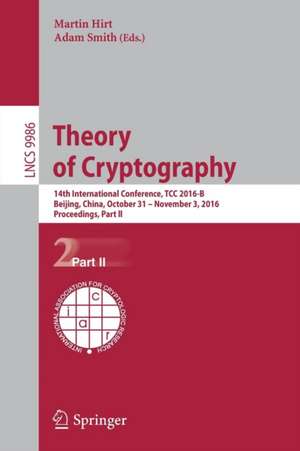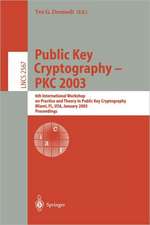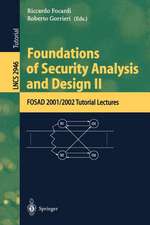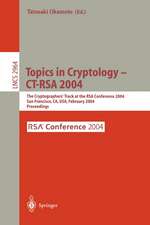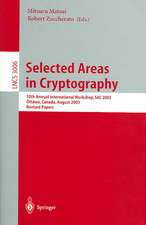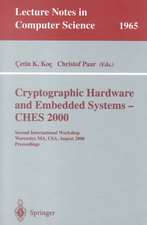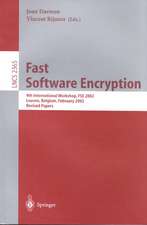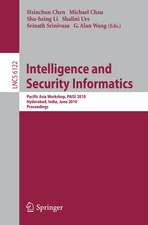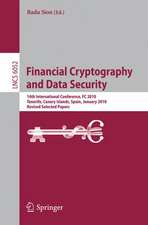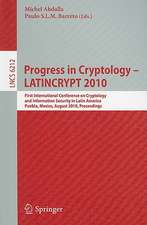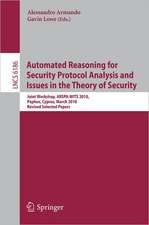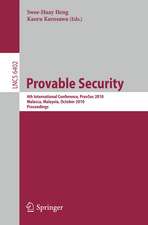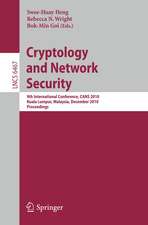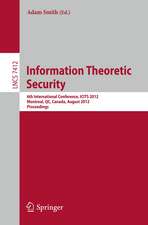Theory of Cryptography: 14th International Conference, TCC 2016-B, Beijing, China, October 31-November 3, 2016, Proceedings, Part II: Lecture Notes in Computer Science, cartea 9986
Editat de Martin Hirt, Adam Smithen Limba Engleză Paperback – 25 oct 2016
The total of 45 revised full papers presented in the proceedings were carefully reviewed and selected from 113 submissions. The papers were organized in topical sections named: TCC test-of-time award; foundations; unconditional security; foundations of multi-party protocols; round complexity and efficiency of multi-party computation; differential privacy; delegation and IP; public-key encryption; obfuscation and multilinear maps; attribute-based encryption; functional encryption; secret sharing; new models.
| Toate formatele și edițiile | Preț | Express |
|---|---|---|
| Paperback (2) | 405.28 lei 6-8 săpt. | |
| Springer Berlin, Heidelberg – 25 oct 2016 | 405.28 lei 6-8 săpt. | |
| Springer Berlin, Heidelberg – 23 oct 2016 | 411.80 lei 6-8 săpt. |
Din seria Lecture Notes in Computer Science
- 20%
 Preț: 1061.55 lei
Preț: 1061.55 lei - 20%
 Preț: 307.71 lei
Preț: 307.71 lei - 20%
 Preț: 438.69 lei
Preț: 438.69 lei - 20%
 Preț: 579.30 lei
Preț: 579.30 lei -
 Preț: 410.88 lei
Preț: 410.88 lei - 17%
 Preț: 427.22 lei
Preț: 427.22 lei - 20%
 Preț: 596.46 lei
Preț: 596.46 lei - 15%
 Preț: 448.04 lei
Preț: 448.04 lei - 20%
 Preț: 353.50 lei
Preț: 353.50 lei -
 Preț: 389.49 lei
Preț: 389.49 lei - 20%
 Preț: 309.90 lei
Preț: 309.90 lei - 20%
 Preț: 645.28 lei
Preț: 645.28 lei - 20%
 Preț: 763.23 lei
Preț: 763.23 lei - 15%
 Preț: 580.46 lei
Preț: 580.46 lei - 20%
 Preț: 310.28 lei
Preț: 310.28 lei - 20%
 Preț: 655.02 lei
Preț: 655.02 lei - 20%
 Preț: 1183.14 lei
Preț: 1183.14 lei - 20%
 Preț: 340.32 lei
Preț: 340.32 lei -
 Preț: 449.57 lei
Preț: 449.57 lei - 20%
 Preț: 591.51 lei
Preț: 591.51 lei - 18%
 Preț: 938.83 lei
Preț: 938.83 lei - 20%
 Preț: 337.00 lei
Preț: 337.00 lei - 20%
 Preț: 649.50 lei
Preț: 649.50 lei - 20%
 Preț: 607.40 lei
Preț: 607.40 lei - 20%
 Preț: 1414.79 lei
Preț: 1414.79 lei - 20%
 Preț: 1024.44 lei
Preț: 1024.44 lei - 20%
 Preț: 583.40 lei
Preț: 583.40 lei - 20%
 Preț: 453.32 lei
Preț: 453.32 lei - 20%
 Preț: 575.49 lei
Preț: 575.49 lei - 20%
 Preț: 1075.26 lei
Preț: 1075.26 lei - 20%
 Preț: 585.88 lei
Preț: 585.88 lei - 20%
 Preț: 825.93 lei
Preț: 825.93 lei - 17%
 Preț: 360.20 lei
Preț: 360.20 lei - 20%
 Preț: 763.23 lei
Preț: 763.23 lei - 20%
 Preț: 340.32 lei
Preț: 340.32 lei - 20%
 Preț: 504.58 lei
Preț: 504.58 lei - 20%
 Preț: 369.13 lei
Preț: 369.13 lei - 20%
 Preț: 580.93 lei
Preț: 580.93 lei - 20%
 Preț: 343.62 lei
Preț: 343.62 lei - 20%
 Preț: 350.21 lei
Preț: 350.21 lei - 20%
 Preț: 583.40 lei
Preț: 583.40 lei - 20%
 Preț: 583.40 lei
Preț: 583.40 lei - 15%
 Preț: 438.59 lei
Preț: 438.59 lei - 20%
 Preț: 341.95 lei
Preț: 341.95 lei - 20%
 Preț: 238.01 lei
Preț: 238.01 lei - 20%
 Preț: 538.30 lei
Preț: 538.30 lei
Preț: 405.28 lei
Nou
Puncte Express: 608
Preț estimativ în valută:
77.56€ • 84.22$ • 65.15£
77.56€ • 84.22$ • 65.15£
Carte tipărită la comandă
Livrare economică 22 aprilie-06 mai
Preluare comenzi: 021 569.72.76
Specificații
ISBN-13: 9783662536438
ISBN-10: 3662536439
Pagini: 593
Ilustrații: XV, 578 p. 32 illus.
Dimensiuni: 155 x 235 x 31 mm
Greutate: 0.82 kg
Ediția:1st ed. 2016
Editura: Springer Berlin, Heidelberg
Colecția Springer
Seriile Lecture Notes in Computer Science, Security and Cryptology
Locul publicării:Berlin, Heidelberg, Germany
ISBN-10: 3662536439
Pagini: 593
Ilustrații: XV, 578 p. 32 illus.
Dimensiuni: 155 x 235 x 31 mm
Greutate: 0.82 kg
Ediția:1st ed. 2016
Editura: Springer Berlin, Heidelberg
Colecția Springer
Seriile Lecture Notes in Computer Science, Security and Cryptology
Locul publicării:Berlin, Heidelberg, Germany
Cuprins
Delegation and IP.- Delegating RAM Computations with Adaptive Soundness and Privacy.- Interactive Oracle Proofs.- Adaptive Succinct Garbled RAM, or How To Delegate Your Database.-Delegating RAM Computations.- Public-Key Encryption.- Standard Security Does Not Imply Indistinguishability Under Selective Opening.- Public-Key Encryption with Simulation-Based Selective-Opening Security and Compact Ciphertexts.- Towards Non-Black-Box Separations of Public Key Encryption and One Way Function.- Post-Quantum Security of the Fujisaki-Okamoto and OAEP Transforms.- Multi-Key FHE from LWE, Revisited.- Obfuscation and Multilinear Maps.- Secure Obfuscation in a Weak Multilinear Map Model.- Virtual Grey-Boxes Beyond Obfuscation: A Statistical Security Notion for Cryptographic Agents.- Attribute-Based Encryption.- Deniable Attribute Based Encryption for Branching Programs from LWE.- Targeted Homomorphic Attribute-Based Encryption.- Semi-Adaptive Security and Bundling Functionalities Made Generic andEasy.- Functional Encryption.- From Cryptomania to Obfustopia through Secret-Key Functional Encryption.- Single-Key to Multi-Key Functional Encryption with Polynomial Loss.- Compactness vs Collusion Resistance in Functional Encryption.- Secret Sharing.- Threshold Secret Sharing Requires a Linear Size Alphabet.- How to Share a Secret, Infinitely.- New Models.- Designing Proof of Human-work Puzzles for Cryptocurrency and Beyond.- Access Control Encryption: Enforcing Information Flow with Cryptography.
Caracteristici
Includes supplementary material: sn.pub/extras
